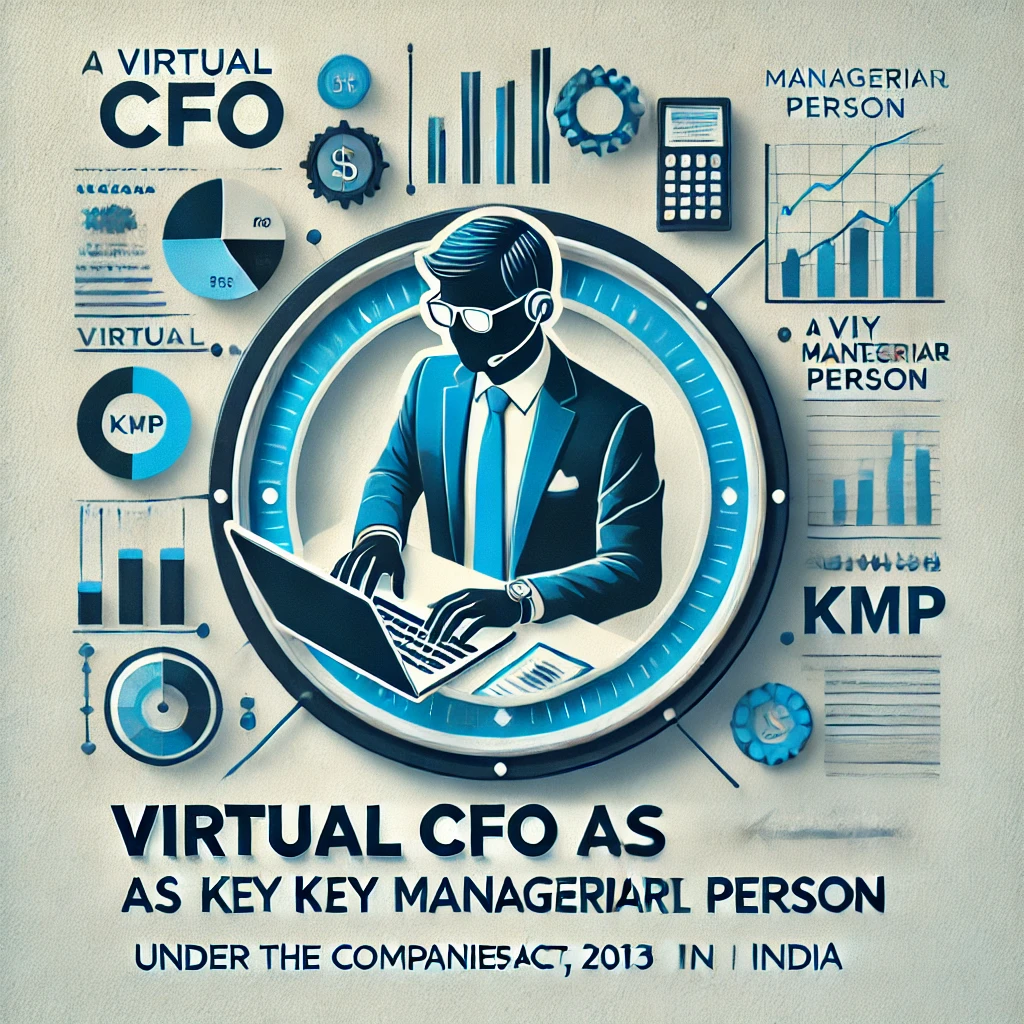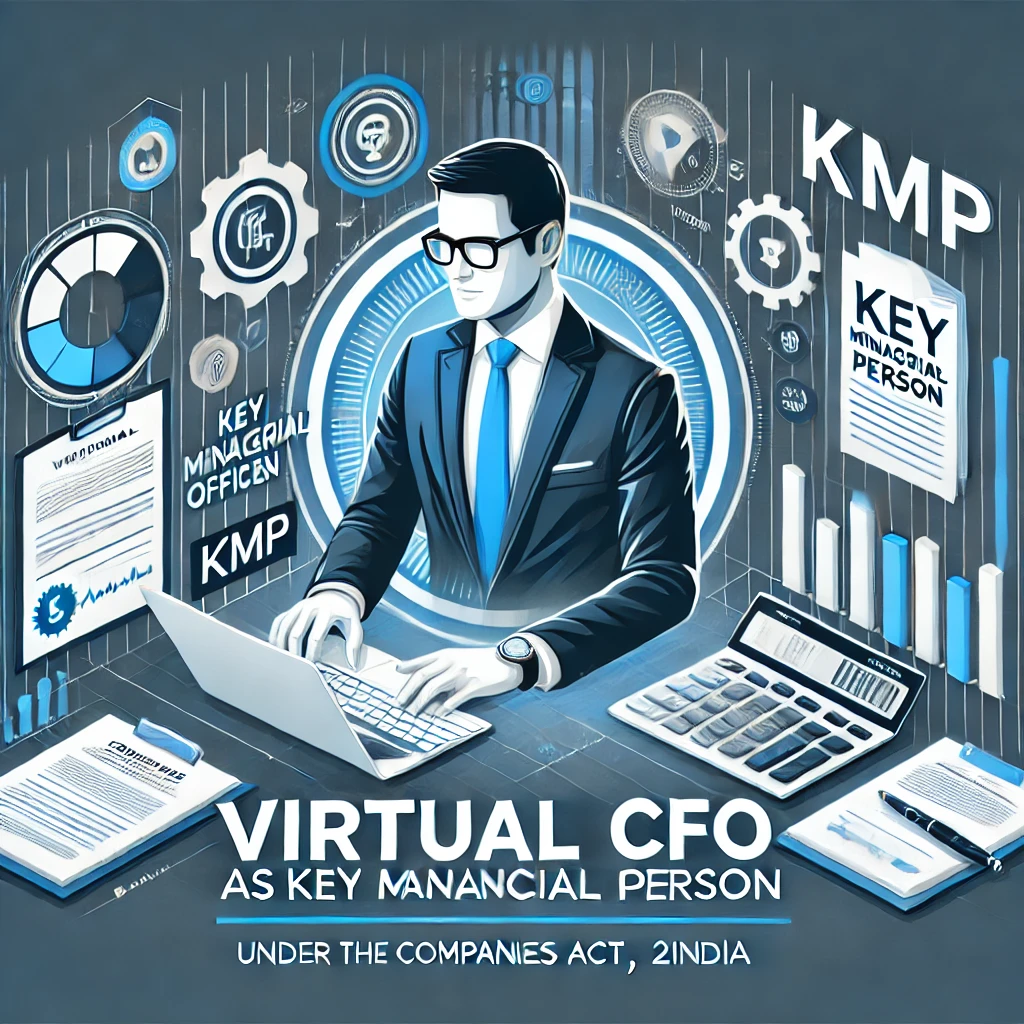Can a Virtual CFO Be a Key Managerial Person (KMP) as per the Companies Act, 2013 in India? (Virtual CFOs as KMPs)
Virtual CFOs as KMPs-The role of a Chief Financial Officer (CFO) has evolved significantly in response to technological advancements and the shifting dynamics of corporate operations. The Virtual CFOs (VCFOs), who provide financial leadership remotely, represent a modern alternative to traditional in-house CFOs. Their rise brings into question whether a Virtual CFO can legally qualify as a Key Managerial Person (KMP) under the Companies Act, 2013 in India.
This article explores the legal, functional, and practical considerations surrounding the designation of a Virtual CFO as a KMP, delving deeply into the provisions of the Companies Act, 2013.

- Understanding Key Managerial Personnel (KMP) under the Companies Act, 2013
- Responsibilities of a CFO as a KMP (Virtual CFOs as KMPs)
- Who is a Virtual CFO?
- Legal Perspective: Can a Virtual CFO Be a KMP? (Virtual CFOs as KMPs)
- Challenges in Appointing a Virtual CFOs as KMPs
- Best Practices for Virtual CFO Integration as KMP (Virtual CFOs as KMPs)
- Conclusion-Virtual CFOs as KMPs
- Disclaimer
Understanding Key Managerial Personnel (KMP) under the Companies Act, 2013
Key Managerial Personnel (KMP) play a pivotal role in corporate governance, ensuring that companies adhere to regulatory norms and maintain financial integrity. Section 2(51) of the Companies Act, 2013, defines KMP to include:
- Managing Director (MD) or Chief Executive Officer (CEO) or Manager
- Company Secretary (CS)
- Whole-Time Director
- Chief Financial Officer (CFO)
- Other officers as prescribed by law
This inclusion underscores the strategic significance of the CFO role. The Act mandates the appointment of KMPs for specific categories of companies, such as listed entities and others notified by regulators, emphasizing their responsibility for governance, compliance, and strategic direction.
Responsibilities of a CFO as a KMP (Virtual CFOs as KMPs)
A CFO appointed as a KMP undertakes critical functions that directly impact a company’s operations and financial health. These responsibilities include:
- Financial Planning and Oversight: Developing accurate financial reports and presenting them to stakeholders.
- Regulatory Compliance: Ensuring adherence to tax laws, accounting standards, and statutory regulations.
- Strategic Guidance: Providing financial insights that aid in resource allocation and decision-making.
- Risk Management: Identifying and mitigating financial risks to protect organizational assets.
These duties necessitate a high level of expertise and integration within the company’s decision-making hierarchy.

Who is a Virtual CFO?
A Virtual CFO is a financial expert who delivers CFO-level services remotely, typically on a part-time or contractual basis. This model appeals to startups and small-to-medium enterprises (SMEs) that require financial leadership without incurring the costs of a full-time executive.
Benefits of a Virtual CFO
- Cost Efficiency: Reduces the financial burden associated with a full-time CFO.
- Tailored Services: Offers customized financial solutions based on the unique needs of the business.
- Experienced Guidance: Provides access to seasoned financial professionals with diverse expertise.
- Technological Leverage: Utilizes advanced tools and systems for effective financial management.
Legal Perspective: Can a Virtual CFO Be a KMP? (Virtual CFOs as KMPs)
The Companies Act, 2013, does not explicitly state that a CFO must be a full-time employee or physically present at the company’s premises. This legal ambiguity allows for the appointment of Virtual CFOs as KMPs under certain conditions:
- Section 203: Appointment of KMPs
- This section requires that KMPs, including CFOs, be formally appointed by the board through a resolution.
- The Act does not restrict the employment model, enabling Virtual CFOs to fulfill this role.
- Board Accountability
- Regardless of the CFO’s mode of operation, they must maintain accountability to the board and perform their duties in compliance with governance norms.
- Contractual Clarity
- A Virtual CFO’s appointment as a KMP should be formalized through a detailed agreement outlining their responsibilities, reporting mechanisms, and deliverables.
Challenges in Appointing a Virtual CFOs as KMPs
While the legal framework supports the inclusion of Virtual CFOs as KMPs, practical challenges must be addressed:
- Regulatory Concerns: Questions about whether a remote CFO can maintain oversight comparable to an in-house counterpart.
- Access to Information: Potential hurdles in securely and promptly accessing sensitive financial data.
- Commitment Levels: Perceived differences in dedication between part-time and full-time roles.
- Cybersecurity Risks: Reliance on digital tools increases exposure to potential cyber threats.
Best Practices for Virtual CFO Integration as KMP (Virtual CFOs as KMPs)
To ensure the effective appointment of a Virtual CFO as a KMP, companies should adopt the following strategies:
- Comprehensive Agreements: Clearly define the scope of the Virtual CFO’s duties and expectations.
- Board Oversight: Regularly review the CFO’s contributions to financial and strategic goals.
- Secure Systems: Implement robust cybersecurity measures to protect data integrity.
- Regular Audits: Conduct compliance and performance audits to ensure adherence to statutory requirements.
- Transparent Communication: Foster open and consistent interactions between the Virtual CFO and other stakeholders.
Conclusion–Virtual CFOs as KMPs
The concept of Virtual CFOs exemplifies the evolution of financial management in the digital age. The Companies Act, 2013, provides the flexibility to accommodate this model, enabling businesses to appoint Virtual CFOs as KMPs when appropriate governance and operational structures are in place.
By leveraging the Virtual CFO model, companies can access high-caliber financial leadership while optimizing costs. However, the success of this arrangement depends on contractual precision, technological readiness, and rigorous adherence to governance principles. This adaptability demonstrates the progressive nature of India’s corporate regulatory framework, aligning with contemporary business needs and fostering innovation in leadership structures.
Disclaimer
This article relies on internal data, publicly available information, and other reliable sources. It may also include the authors’ personal views. However, it’s essential to note that the information is for general, educational, and awareness purposes only—it doesn’t disclose every material fact. This analysis is for informational purposes only and does not constitute financial advice. Consult a professional before making investment decisions.
We publish information on World Virtual CFO in good faith, solely for general information. World Virtual CFO doesn’t guarantee the completeness, reliability, or accuracy of this information. These are our views for informational purposes. When you use our website, know that any action you take is entirely at your own risk. World Virtual CFO won’t be liable for any losses or damages connected to your use of our website. For detailed information, refer to our disclaimer page.
Dr. Dinesh Sharma is an award-winning CFO and AI strategist with over two decades of experience in financial leadership, digital transformation, and business optimization. As the founder of multiple niche platforms—including WorldVirtualCFO.com—he empowers professionals and organizations with strategic insights, system structuring, and innovative tools for sustainable growth. His blogs and e-books blend precision with vision, making complex financial and technological concepts accessible and actionable.